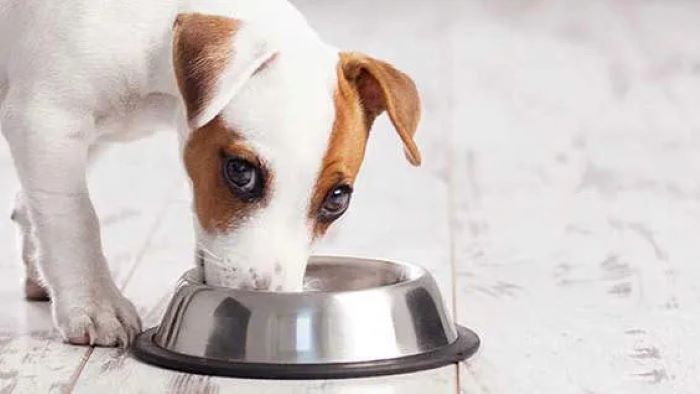As we all know how much our dogs love to eat all the time, regardless of the time span between the previous meal. Thus, we always make sure to provide them with the healthiest nutrients. However, we rarely think about ‘how long does it take a dog to digest food?’
Just like humans, even dogs need to digest food effectively to absorb all the nutrients, but the time it takes to digest the food varies for human beings.

How Long Does It Take a Dog to Digest Food?
The food digestion process in dogs generally begins from mouth to anus quite similiar like humans. During the digestion the food break downs and the nutrients in it are absorbed and the wastes are removed.
The duration required for the dogs to digest the food depends on factors like type of food, the amount of the food, dog’s size and breed respectively. Here is a classified explanation of how the dog’s digestive system[1] works:
- It takes approximately 6 to 8 hours for the dog to move through the stomach and small intestine. In this period of 6 to 8 hours the nutrients present in the food are absorbed.
- After the absorbtion of the nutrients within 10 to 24 hours the food passes throught he large intestine. Here the feces are formed and removed from the dog’s body.
Thus the maximum time required for the digestion of the food in the dog is somewhat 24 hours.
How is Food Digested in Dogs?

The digestive process begins as soon as your dog starts chewing on her food. The meal travels down the esophagus and into the stomach after being cut up into smaller pieces by the teeth. Enzymes and hydrochloric acid, a stomach acid, are used here to digest the food. The food is broken down into easily absorbed nutritious components by natural enzymes.
The walls of the intestines absorb vital nutrients and water into the bloodstream as food passes from the stomach and into the intestinal system. This digesting process is aided by additional enzymes produced by organs like the liver and pancreas.
Factors Affecting the Digestion Process

There is no fixed timing for the digestion process in dogs, each dog is unique. Thus, these are some of the following factors that may affect the digestion process in your furry friends:
- Size of your dog: Larger dogs tend to take longer time to digest food, whereas, smaller dogs can digest food in minimal duration.
- Breed of your dog: It is the most important factor affecting the digestion process.
- Age of your dog: Younger dogs tend to excrete more often than much older dogs, just like in human beings.
- The activity level of your dog: Dogs have the ability to store large amounts of food, and slowly digest food in their stomach to produce energy. Therefore, the more a dog uses its energy, the faster the stored food will be broken down.
- Type of food intake: The digestion duration also depends on what type of food is being served to your dog. Heavily processed food will take longer duration to digest than natural and dry food.
How to Promote Adequate Digestion?
As a dog owner, it becomes your utmost priority to improve your furry friend’s health. Neglecting its digestive health may prove to be one of your worst decisions. Thus, below are the following methods to promote your dog’s digestion:
- Regular exercise: You must take your dog out for regular walks and running sessions to keep its bowel movement healthy. It also improves the blood flow in the body.
- High protein diet: It ensures the repairs and growth of a dog’s tissues. It encourages the formation of strong muscles and hair growth.
- Liquid intake (Hydration): Water is necessary for the functioning of all organs and improves the metabolism level in your dog. It also mitigates the chances of constipation as water softens the feces.
FAQs
1. What are some of the digestive problems in a dog?
A dog can experience various digestive issues including tumours in the digestive system, exocrine pancreatic insufficiency (EPI), intestinal parasites, viral or bacterial infections, gallbladder problems, and gastroenteritis.
2. What happens to undigested food in dogs?
Not all food eaten by your dog is digested, the essential nutrients are absorbed by the body through the intestines. Fibers, Inorganic matter, water, and bacteria are left behind. This undigestible matter is removed by the body through the rectum in the form of feces.
3. Why does my dog poop right after having food?
This does not mean that your dog has excreted all the food it had right now, this is not possible as food cannot be digested this quickly. It actually means that she has removed the food that was eaten before 8-12 hours.
As new food enters the stomach, the large intestines get a signal to push out any waste that is sitting there from earlier. This is called the gastrocolic reflex.
4. What are some of the symptoms of digestive problems in my dog?
The symptoms of digestive problems in a dog can include abdominal pain, changes in weight (such as weight loss or weight gain), decreased appetite, vomiting, diarrhea, and constipation.
5. Should I provide my dog with Enzyme supplements?
Dogs have more than enough digestive enzymes. They tend to also get more enzymes from their stable diet. Thus, it is unnecessary to provide your dog with extra enzyme supplements unless and until your dog has any disease or visible digestive issues.
Conclusion
Therefore, with all the information provided in this article, you have adequate knowledge about your dog’s digestive health and how to improve it if necessary. Always provide your dog with the best diet possible, try and include raw food that can promote her digestive wellness through the smooth movement of food through its system. If you suspect any recent abnormality in your dog’s digestion, it’s best to consult your vet to know more about your dog’s health.
References:
- Digestive System of the Dog. (2022, March 10). Veterinary Teaching Hospital.



